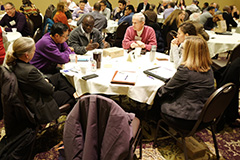February 1, 2017
Colleges of Agriculture and Veterinary Medicine convene experts to enhance sustainability of crops-livestock systems

Two colleges at Kansas State University, Agriculture and Veterinary Medicine, have joined forces and expertise for a common mission. Together they had an inaugural Sustainable Crops-Livestock Systems Summit at the K-State Alumni Center on Jan. 9.
"Sustainability means that the needs of the present are met without compromising the needs of future generations," said Keith Hamilton, executive director of international agricultural programs in the College of Veterinary Medicine. "Today, sustainability, including a sustainable food supply, is the biggest long-term challenge facing humanity. As demands on the agriculture sector continue to be driven by population growth, ecosystems are being pushed beyond their limits. The demand on agriculture and the stress on ecosystems is further exacerbated by inefficiencies and losses along the food chain and the negative impacts of human agricultural activity."
"Collectively K-State has the breadth and depth of knowledge and the multidisciplinary profile to address some of the biggest challenges facing the sustainability of food delivery, which also address many of the UN Sustainable Development Goals," said Nina Lilja, associate dean of international agricultural programs in the College of Agriculture. "As an example, the U.S. Agency for International Development has made an investment of over $100 million by awarding four Feed the Future Innovation Labs to K-State. These labs are a testament to K-State's ability to tackle some of the world's greatest challenges in agriculture and food security, and build on our expertise in Sorghum and Millet, Wheat Genomics, Reduction of Post-Harvest Loss and Sustainable Intensification."
Gary Pierzynski, head of the agronomy department, reminded the group that the summit was the next step following the success of a small multidisciplinary focus group meeting in summer 2016.
The colleges convened experts from across campus to look for ways to improve and enhance the sustainability of mixed crop-livestock systems both nationally and internationally. A pair of renowned international experts were brought in to jumpstart the summit and stimulate group exercises that followed the presentations.
Pierre Gerber, senior livestock specialist at the World Bank, examined trends in feed systems, land usage and impact of greenhouse gas emissions. He highlighted that today, agriculture contributes an estimated 13 percent of total global greenhouse gas emissions. If immediate action is not taken, projections suggest that by 2050 agriculture and land use changes will contribute 70 percent of total greenhouse gas emissions globally.
Marjatta Eilitta, deputy director of the U.S. Agency for International Development's Feed the Future Innovation Lab for Livestock Systems at the University of Florida, addressed sustainable improvements in productivity, health, marketing and consumption to alleviate poverty and improve nutrition of vulnerable livestock holders in target countries, such as Niger, Ethiopia, Tanzania and Cambodia.
In addition to the two guest presenters, Deon van der Merwe, associate professor in the College of Veterinary Medicine, spoke to the group via Skype from the Netherlands to share a success story about the benefits of cross-college collaborations.
"Our objective is to engage, maintain and further develop a guiding coalition or network on sustainable crop-livestock systems, and to steer K-State toward recognition as a national leader in the delivery and adoption of science and technology which improves the sustainability of crop-livestock systems," Lilja said. "The participation from both colleges was excellent."
The summit participants divided into 10 tables, each of which had a similar multidisciplinary profile, including soil science, water science, animal production, crops, climate, epidemiology, infectious diseases and bio-engineering. Then each group looked at the critical questions that could be addressed at a future symposium, the strengths the university offers for making advances in sustainable crop-livestock systems, and they provided specific multidisciplinary research ideas which would address serious research gaps.
"The groups identified several strengths at K-State," Pierzynski said. "We developed a valuable list of baseline tools and knowledge and several ideas for research projects."
The next steps are currently being discussed and include ideas such as the further development of research ideas, a collective response to calls for proposals, the formation of a steering group, brownbag seminars, and an International Symposium on Sustainable Crop-Livestock Systems in 2018.
More information about the summit is available online.
